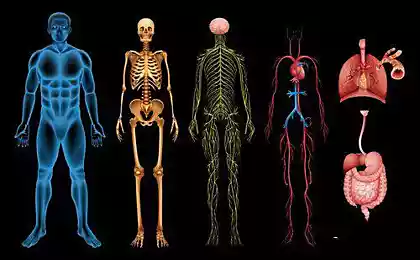278
8 Signs Your Body Gives When It Needs a Break

Our body has an amazing ability to signal the need for rest.
In today’s world of high speeds and endless tasks, we often ignore the basic needs of our bodies. We are used to functioning at the limit of our abilities, forgetting that our body is not a mechanism, but a complex biological system that requires proper care and periodic reboot. The ability to recognize fatigue signals is not just a useful skill, but a necessity for long-term health and high productivity.
According to the American Psychological Association, about 77% of people regularly experience physical symptoms caused by stress and fatigue. However, only 28% are able to effectively recognize and respond to their body’s signals to rest.
Studies show that regular quality rest increases productivity by 37%, improves cognitive function by 40% and reduces the risk of chronic diseases by 21%. Ignoring fatigue signals can lead to chronic fatigue syndrome, burnout and serious health problems.
1. Chronic fatigue that does not go away after a night’s sleep
If you wake up feeling like you haven’t rested at all, despite a full 7-8-hour nap, this is the first and most obvious signal of overload. Chronic fatigue is the result of accumulated rest deficits and may indicate that your body needs a deeper recovery.
Practical advice: Get yourself a “mini-vacation” of 3 to 5 days with minimal activity. Focus on restoring sleep patterns by practicing going to bed at the same time. Eliminate caffeine and alcohol for this period and spend at least 1-2 hours outdoors daily.
2. Increased irritability and emotional instability

Emotional instability is a sure sign that the body has exhausted resources
If you notice that you have become acutely responsive to minor troubles, often break down on loved ones or colleagues for no serious reason, this indicates that your nervous system is overloaded. The emotional center of the brain is particularly sensitive to accumulated stress and lack of rest.
How to restore emotional balance:
- Mindfulness practice: Set aside 10-15 minutes daily for meditation or breathing exercises, which will help reduce cortisol levels by 25%.
- Technological detox: Set periods (at least 2-3 hours a day) when you completely disconnect from gadgets and information flow.
- Physical practices: Yoga, tai chi or just stretching help relieve muscle tension, which increases emotional discomfort.
3. Concentration problems and cognitive decline
If you notice that you find it harder to focus on tasks, make uncharacteristic mistakes, or forget important details, this is a direct indication of mental depletion. Our brain, like any other organ, needs regular rest to repair neural connections.
Long-term neglect of cognitive symptoms of fatigue increases the risk of developing so-called “mental fog” – a condition in which the processes of thinking, memory and concentration are disrupted.
Effective solution: Use the “cognitive interval” technique – work concentrated for 25-30 minutes, then take a 5-minute break. After 4 such cycles, arrange a longer rest for 15-30 minutes.
4. Sleep disorders: difficulty falling asleep or restless sleep
Paradoxically, excessive fatigue often leads to sleep problems. If you have difficulty falling asleep despite fatigue, wake up in the middle of the night, or your sleep has become superficial and restless, this is a sign of an imbalance in the nervous system.
Strategy for restoring healthy sleep:
- Synchronization with circadian rhythms: Lie down and get up at the same time, even on weekends. This helps stabilize the biological clock.
- Sleep preparation ritual: For 1-1.5 hours before bedtime, exclude screens of gadgets, dim the lighting and engage in quiet activities.
- Optimizing the sleeping environment: The temperature in the bedroom is 18-20 ° C, no sources of noise and light, a comfortable mattress and pillow.
5. Frequent headaches and muscle tension
Regular tension headaches, discomfort in the cervical collar area, back or other muscle groups are a physical manifestation of accumulated stress and fatigue. With prolonged tension, the muscles do not get the opportunity to fully relax.
The technique of progressive muscle relaxation according to Jacobson can reduce muscle tension by 60-70% in one session. The essence of the technique is the consistent tension and relaxation of various muscle groups, which helps the brain “relearn” and send the muscles into a state of deep relaxation.
6. Decreased immunity and frequent diseases
729194
The immune system is one of the first to respond to chronic fatigue
If you get sick more often, recover longer after a common cold or experience relapses of chronic diseases - this is a serious indicator of the depletion of body resources. Prolonged stress and lack of proper rest lead to a decrease in the activity of immune cells.
How to maintain immunity during recovery:
- Normalization of sleep: Aim for 7-9 hours of uninterrupted night sleep.
- Adaptogens: Natural immunomodulators (eleutherococcus, ginseng, Rhodiola rosea) help the body adapt to stress without depleting resources.
- Moderate physical activity: 30-minute walks at a fast pace 5 times a week increase the number and activity of NK cells by 30%.
7. Changes in eating behavior and weight
Sharp changes in appetite, craving for high-calorie food or sugar, unexplained weight fluctuations - all this can be associated with depletion of the body's adaptive resources and hormonal imbalance.
Stress-induced overeating can create a vicious cycle: eating high-calorie foods temporarily improves mood through the release of dopamine, but then leads to blood sugar spikes, energy slumps, and increased feelings of fatigue.
Practical advice: Use the technique of three deep breaths before eating. This activates the parasympathetic nervous system, improves digestion and helps to more consciously assess the degree of hunger.
8. Decreased motivation and loss of interest in normal activities
If activities that used to bring you joy and satisfaction now seem burdensome or indifferent, this is a serious sign of energy and emotional exhaustion.
How to restore motivation and interest in life:
- Pleasure microdose: Start with short (5-10 minutes) sessions of enjoyable activity without waiting for a specific result.
- Gamification strategy: Break the return to normal activities into small achievable steps and celebrate each success.
- Change of situation: Even a short trip to nature or a new place can “reset” perception and trigger the mechanisms of natural curiosity.
Listening to your body is the way to high productivity and longevity
The ability to recognize and respond to fatigue signals in a timely manner is not a sign of weakness, but a manifestation of wisdom and self-care. Regular quality rest and recovery are as important components of success and efficiency as productive work.
Studies in neuroscience and psychology show that the optimal mode of human activity involves a rhythmic alternation of periods of activity and rest. Learn to treat fatigue signals not as an unpleasant hindrance, but as valuable feedback from your body that helps conserve energy and achieve lasting results in the long run.
Glossary of terms
Circadian rhythms
Natural biological processes that cycle about every 24 hours. Regulate the sleep-wake cycle, hormone production, body temperature and other physiological processes.
cortisol
Stress hormone produced by the adrenal glands. With prolonged increase, it can cause various disorders in the body, including immunosuppression and metabolic disorders.
Adaptogens
Natural substances of plant origin, which increase the nonspecific resistance of the body to a wide range of harmful effects of physical, chemical and biological nature.
NK cells
Natural killer cells are immune system cells that attack and destroy viruses, bacteria and cancer cells without prior sensitization.
Chronic fatigue syndrome
A complex disease characterized by severe fatigue that does not go away after rest and cannot be explained by other medical conditions.
Parasympathetic nervous system
The part of the autonomic nervous system responsible for "rest and recovery." Activation of the parasympathetic nervous system promotes relaxation, improved digestion and tissue repair.
How to understand how money works in our world, how to start earning
6 ways to develop thoughtful thinking and how it will help in life























